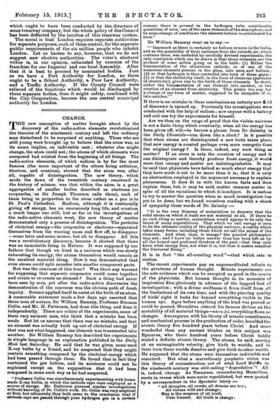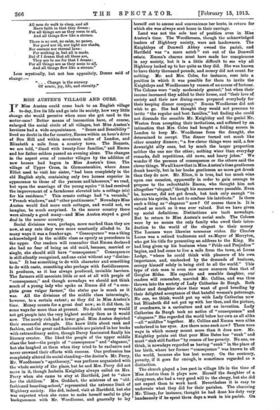CHANGE.
THE new conception of matter brought about by the discovery of the radio-active elements revolutionized the theories of the nineteenth century and left the ordinary man disinclined to be surprised at anything. Those who are still young were brought up to believe that the atom was, as
its name implies, an indivisible unit ; whatever else might change, the atom could not ; the atoms of which elements were composed had existed from the beginning of all things. The radio-active elements, of which radium is by far the most famous (the more important of the others being actinium, thorium, and uranium), showed that the atom was, after all, capable of disintegration. The new theory, which made the dawn of the twentieth century renowned in the history of science, was that within the atom is a great aggregation of smaller bodies described as electrons (or corpuscles, as Sir Joseph Thomson calls them), each of them being in proportion to the atom rather as a pea is to St. Paul's Cathedral. Radium, although it is continually giving off energy, has an enormously long life, and uranium a much longer one still, but so far as the investigations of the radio-active elements went, the new theory of matter demonstrated only a process of disintegration. The particles of electrical energy—the corpuscles or electrons—separated themselves from the warring mass and flew off, to disappear —some later and some sooner, but all to disappear. All this was a revolutionary discovery, because it showed that there was no immutable thing in Nature. It was supposed by our fathers that though we lived in a universe which was slowly exhausting its energy, the atoms themselves would remain as the smallest material thing. Now it was demonstrated that even atoms could split asunder into smaller component parts.
But was the converse of this true ? Was there any warrant for supposing that separate corpuscles could come together and create or re-create an element ? Such a thing had never been seen by man, yet after the radio-active discoveries the demonstration of the converse was the obvious path of fresh inquiry. Science applied itself to assist at the birth of an atom.
A memorable statement made a few days ago asserted that three men of science, Sir William Ramsay, Professor Norman Collie, and Mr. H. Patterson, had done this thing, and done it independently. There are critics of the experiments, some of them very eminent men, who think that a mistake has been made. But let us assume that there was no mistake, and that
an element was actually built up out of electrical energy. into that was not what happened, one element was transmuted into another. Sir William Ramsay has described the experiments
in simple language in an explanation published in the Daily
Mail last Saturday. He said that he was given some used X-ray bulbs by a friend, and he suspected that they might contain something composed by the electrical energy which had been passed through them. He found that in faet.theY contained the gas helium, and its existence could not be explained except on the supposition that it had been
composed in some such way as he had suspected.
"Professor Collie was simultaneously experimenting with home- made X-ray bulbs, in which the cathode rays were employed as a source of energy. Mr. Patterson pursued similar investigations without knowing of Dr. Collie's work. Dr. Collie was very sceptical at first, but ultimately they both came to the conclusion that if cathode rays are pained through pure hydrogen gas in a certain
manner there is present in the hydrogen tube considerable quantities of neon, one of the rarer elements of the atmosphere, awl by some change of conditions the element helium is substituted for neon."
Sir William Ramsay went on to say :— "' Inasmuch as there is certainly no helium or neon in the bulbs, and as the possibility of their entrance from the outside air, which contains them, was excluded by carefully devised experiments, the only conclusion which can be drawn is that these elements are the product of some action going on in the bulb: (1) Either the transmutation of the aluminium cathode, or of one of the numerous elements present in the glass, into neon and helium; (2) or that hydrogen is thus converted into both of these gases ;
(3) or that the electricity itself, in the form of electrons (particles of electricity), gives rise to the birth of these elements. In short, either the transmutation of one element into another, or the creation of an element from electricity. This points the way for a change of one form of matter, supposed to be incapable of it, into another.'"
If there is no mistake in these conclusions an entirely new Slid
of discovery is opened up. Previously the investigations were conducted with the help of radium ; now anyone with a battery and coil can try the experiments for himself.
Are we then on the verge of proof that the visible universe is not a finite thing which eventually, when all the energy has been given off, will—to borrow a phrase from Dr. Saleeby in the Daily Chronicle—run down like a clock ? Is it possible that when atoms are disintegrated a new birth takes place, that new energy is created perhaps even more energetic than the original energy P Is there, indeed, any such thing as matter? If an atom is only the creation of energy and it can disintegrate and thereby produce fresh energy, it would seem that energy and matter are indistinguishable. It may be said that physicists have talked so much about energy that they have made it out to be more than it is; that it is only an abstraction employed in the argument necessary to explain phenomena. It does fit in with the known facts and does explain them, but, it may be said, matter remains matter in spite of all the variations to which it is subject. It is useless to try to answer the question when so much investigation has yet to be done, but we found ourselves reading with a shock of sympathy these words of Dr. Saleeby :—
" It is the very Nemesis of materialism to discover that the solid atoms on which it built are not material at all. If there be no such thing as matter, materialism would appear to be only the latest of many superstitions. That which wo call energy is seen to be the ultimate reality of the physical universe, a reality which takes many forms, including those which we call the atoms of the elements. And what, then, is energy? the puzzled philosopher may ask ; and I know no better answer than has been left us by all the honest and profound thinkers of the past—that they only know what energy does, not what it is, but that it makes manifest the Universal Being."
It is in fact "the all-creating, word "—that which sets in motion.
The recent experiments pay an unpremeditated tribute to the greatness of human thought. Minute experiments are the sole evidence which can be accepted as good in the courts of the physicists. But human thought in its moments of inspiration flies gloriously in advance of the laggard foot of investigation ; with a divine swiftness it frees itself from all
the limitations of its own time, and with the piercing quality of birds' sight it looks far beyond everything visible to the human eye. Ages before anything of the kind was proved or could be proved, Heraclitns uttered his famous dictum on the mutability of all material things—,gorge iSvi; everything flows or changes. Anaxagoras, with his theory of minute constituents and mechanical process in the production of order, heralded the atomic theory five hundred years before Christ. And more
wonderful than any ancient thinker on this subject was Epicurus,. who three hundred years before Christ boldly stated a definite atomic theory. The atoms, he said, moving at an unimaginable velocity, give birth to worlds, and in their turn these worlds dissolve and give birth to other worlds. He supposed that the atoms were themselves indivisible and remained. But what a marvellously prophetic vision was this theory of reconstruction out of what Lord Kelvin in the nineteenth century was still calling "degradation "! All is, indeed, change. As Tennyson, remembering Heraclitus, wrote in verses which were never republished, but were quoted
by a correspondent in the Spectator lately :—
" All thoughts, all creeds, all dreams are trill,
All visions wild and strange ;
Man is the measure of all truth
Unto himself. All truth is change :
of All men do walk in sleep, and all Have faith in that they dream : For all things are as they seem to all, And all things flow like a stream.
There is no rest, no calm, no pause, Nor good nor ill, nor light nor shade, Nor essence nor eternal laws: For nothing is, but all is made. But if I dream that all these are, They are to me for that I dream: For all things are as they seem to all, And all things flow like a stream."
Less mystically, but not less appositely, Donne said change :—
". . . Change is the nursery Of music, joy, life, and eternity."











































 Previous page
Previous page